
The Open Flemish Liberals and Democrats is a Flemish liberal political party in Belgium. The party has been described as centre-right and has smaller factions within the party that have conservative liberal and social liberal views. The party is a member of the Liberal Group, Renew Europe, and Liberal International.
Vooruit is a Flemish social democratic political party in Belgium. It was known as the (Flemish) Socialist Party until 21 March 2021, when its current name was adopted.

The New Flemish Alliance is a Flemish nationalist, conservative and Eurosceptic political party in Belgium. The party was established in 2001 by the right-leaning faction of the centrist-nationalist People's Union (VU).
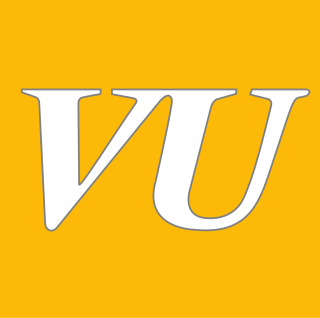
People's Union was a Flemish nationalist political party in Belgium, formed in 1954 as a successor to the Christian Flemish People's Union.

Roland Duchâtelet is a Belgian businessman and politician. He is the owner of football club Újpest. He is the founder of the social-liberal political party Vivant in Belgium.

Flanders is both a cultural community and an economic region within the Belgian state, and has significant autonomy.
This article gives an overview of liberalism in Belgium. Liberalism was a dominant force since the Belgian independence from the Netherlands. It is limited to liberal parties with substantial support, mainly proved by having had a representation in parliament. The sign ⇒ denotes another party in that scheme. For inclusion in this scheme it is not necessary that parties labeled themselves as a liberal party.
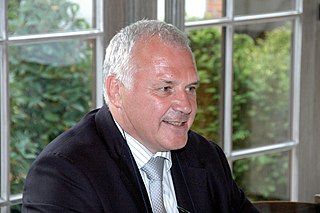
Jean-Marie Louis Dedecker is a Belgian politician.

Flemish political parties operate in the whole Flemish Community, which covers the unilingual Flemish Region and the bilingual Brussels-Capital Region. In the latter, they compete with French-speaking parties that all also operate in Wallonia. There are very few parties that operate on a national level in Belgium. Flanders generally tends to vote for right-wing, conservative parties, whereas in French-speaking Belgium the socialist party is usually the most successful one.
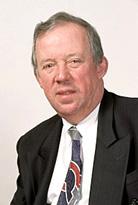
Eduard Marie August "Ward" Beysen was a Belgian politician and well-known freemason. He held a degree in Dutch and history teaching, obtained in 1963, in Lier and started his political career in the seventies in the Flemish liberal party, the Party for Freedom and Progress (PVV), which was renamed Flemish Liberals and Democrats (VLD) in 1992. Ward Beysen – suffering a depression – died by drowning himself in the lake of Fort 6 in the south of Antwerp.

The Federal Government of Belgium exercises executive power in the Kingdom of Belgium. It consists of ministers and secretary of state drawn from the political parties which form the governing coalition. The federal government is led by the prime minister of Belgium, and ministers lead ministries of the government. Ministers together form the Council of Ministers, which is the supreme executive organ of the government.

The Flemish Government is the executive branch of the Flemish Community and the Flemish Region of Belgium. It consists of a government cabinet, headed by the Minister-President and accountable to the Flemish Parliament, and the public administration divided into 13 policy areas, each with an executive department and multiple agencies.

Federal elections were held in Belgium on 10 June 2007. Voters went to the polls in order to elect new members for the Chamber of Representatives and Senate.

Libertarian, Direct, Democratic is a conservative-liberal, libertarian, right-wing populist Flemish political party in Belgium.
The issue of the universal basic income gained prominence on the political agenda in Netherlands between the mid-1970s and mid-1990s but it has disappeared from the political agenda over the last fifteen years.
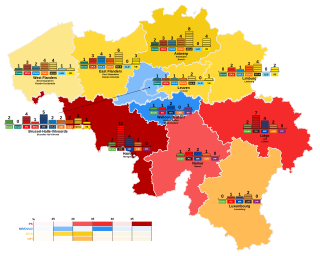
Federal elections were held in Belgium on 13 June 2010, during the midst of the 2007-11 Belgian political crisis. After the fall of the previous Leterme II Government over the withdrawal of Open Flemish Liberals and Democrats from the government the King dissolved the legislature and called new elections. The New Flemish Alliance, led by Bart De Wever, emerged as the plurality party with 27 seats, just one more than the francophone Socialist Party, led by Elio Di Rupo, which was the largest party in the Wallonia region and Brussels. It took a world record 541 days until a government was formed, resulting in a government led by Di Rupo.
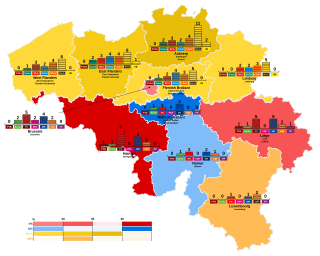
Federal elections were held in Belgium on 25 May 2014. All 150 members of the Chamber of Representatives were elected, whereas the Senate was no longer directly elected following the 2011–2012 state reform. These were the first elections held under King Philippe's reign.
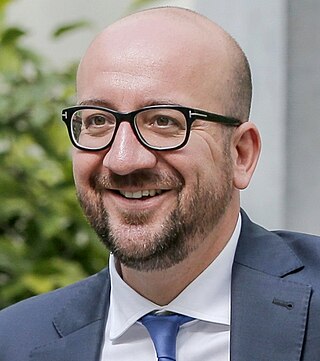
The Michel I Government was the Federal Government of Belgium formed following the 2014 Belgian government formation and sworn in on 11 October 2014. The administration was a centre-right coalition of the New Flemish Alliance (N-VA), the Christian Democratic and Flemish (CD&V), the Open Flemish Liberals and Democrats and the Reformist Movement (MR). The prime minister was Charles Michel. The government had an agenda of socio-economic reforms, especially through austerity measures, with its priorities being improving Belgium's economic competitiveness and reducing unemployment. It fell in December 2018 over the Global Compact for Migration.
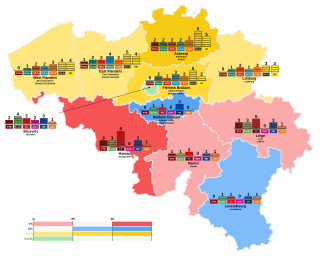
Federal elections were held in Belgium on 26 May 2019, alongside the country's European and regional elections. All 150 members of the Chamber of Representatives were elected from eleven multi-member constituencies.















